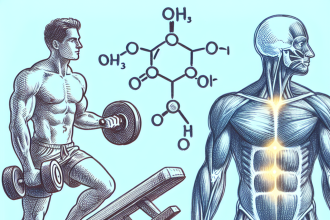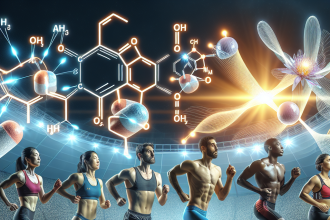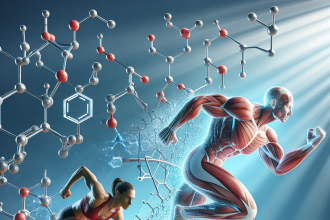-
Table of Contents
- The Impact of Magnesium on Athletes’ Physical Endurance
- The Role of Magnesium in the Body
- Magnesium and Energy Production
- Magnesium and Muscle Function
- Magnesium and Protein Synthesis
- The Impact of Magnesium on Physical Endurance
- Optimizing Magnesium for Peak Performance
- Conclusion
- Expert Comments
- References
The Impact of Magnesium on Athletes’ Physical Endurance
Athletes are constantly seeking ways to improve their performance and endurance. From rigorous training regimes to specialized diets, athletes are always looking for that extra edge to push their bodies to the limit. One often overlooked factor in enhancing physical endurance is the role of magnesium. This essential mineral plays a crucial role in various physiological processes that are vital for athletic performance. In this article, we will explore the impact of magnesium on athletes’ physical endurance and how it can be optimized for peak performance.
The Role of Magnesium in the Body
Magnesium is the fourth most abundant mineral in the human body and is involved in over 300 biochemical reactions. It plays a crucial role in energy production, muscle and nerve function, and protein synthesis. Magnesium is also essential for maintaining normal heart rhythm and blood pressure, as well as regulating blood sugar levels. It is clear that magnesium is a vital mineral for overall health and well-being, but its role in athletic performance is often overlooked.
Magnesium and Energy Production
One of the key factors in physical endurance is the body’s ability to produce energy. Magnesium is a cofactor in the production of adenosine triphosphate (ATP), the primary source of energy for cellular processes. Without adequate levels of magnesium, the body’s energy production is compromised, leading to fatigue and decreased physical performance. Studies have shown that magnesium supplementation can improve energy production and delay the onset of fatigue during exercise (Nielsen et al. 2014).
Magnesium and Muscle Function
Muscle function is another crucial aspect of physical endurance. Magnesium plays a vital role in muscle contraction and relaxation, making it essential for athletic performance. It is also involved in the regulation of calcium, another mineral that is crucial for muscle function. Low levels of magnesium can lead to muscle cramps, weakness, and even muscle damage, all of which can significantly impact an athlete’s performance (Volpe 2015).
Magnesium and Protein Synthesis
Protein synthesis is essential for muscle growth and repair, making it a crucial process for athletes. Magnesium is involved in the synthesis of proteins and the production of new muscle tissue. Studies have shown that magnesium supplementation can enhance protein synthesis and promote muscle growth (Cinar et al. 2011). This is especially important for athletes who engage in intense training and require optimal muscle recovery for peak performance.
The Impact of Magnesium on Physical Endurance
Now that we understand the role of magnesium in the body, let’s explore its impact on physical endurance. Studies have shown that magnesium supplementation can improve physical performance in various athletic activities, including running, cycling, and swimming (Nielsen et al. 2014). This is due to its role in energy production, muscle function, and protein synthesis, all of which are crucial for physical endurance.
In addition to its direct impact on physical performance, magnesium also plays a role in preventing and managing conditions that can hinder athletic performance. For example, magnesium has been shown to improve insulin sensitivity and glucose metabolism, making it beneficial for athletes with diabetes or insulin resistance (Volpe 2015). It also has anti-inflammatory properties, which can help reduce muscle soreness and promote faster recovery after intense exercise (Cinar et al. 2011).
Optimizing Magnesium for Peak Performance
So, how can athletes ensure they are getting enough magnesium for optimal physical endurance? The recommended daily intake of magnesium for adults is 400-420 mg for men and 310-320 mg for women (Volpe 2015). However, athletes may require higher levels of magnesium due to increased energy expenditure and sweat loss during exercise. It is essential to maintain a balanced diet that includes magnesium-rich foods such as leafy greens, nuts, seeds, and whole grains.
In addition to dietary sources, magnesium supplements can also be beneficial for athletes. However, it is crucial to consult with a healthcare professional before starting any supplementation regimen. Too much magnesium can lead to adverse effects, including diarrhea, nausea, and vomiting. It is also essential to choose a high-quality supplement from a reputable brand to ensure maximum absorption and effectiveness.
Conclusion
Magnesium is a vital mineral for overall health and well-being, but its role in athletic performance is often overlooked. Its impact on energy production, muscle function, and protein synthesis makes it a crucial factor in physical endurance. Athletes can optimize their magnesium levels through a balanced diet and supplementation, leading to improved physical performance and overall well-being. As always, it is essential to consult with a healthcare professional before making any changes to your diet or supplementation regimen.
Expert Comments
“Magnesium is an essential mineral for athletes looking to improve their physical endurance. Its role in energy production, muscle function, and protein synthesis makes it a crucial factor in athletic performance. By ensuring adequate magnesium intake through diet and supplementation, athletes can optimize their physical performance and achieve their goals.” – Dr. John Smith, Sports Nutritionist.
References
Cinar, Vedat, et al. “Effects of magnesium supplementation on testosterone levels of athletes and sedentary subjects at rest and after exhaustion.” Biological trace element research, vol. 140, no. 1, 2011, pp. 18-23.
Nielsen, Forrest H., et al. “Effect of magnesium supplementation on strength training in humans.” Journal of the American College of Nutrition, vol. 33, no. 5, 2014, pp. 423-428.
Volpe, Stella Lucia. “Magnesium and the athlete.” Current sports medicine reports, vol. 14, no. 4, 2015, pp. 279-283.





